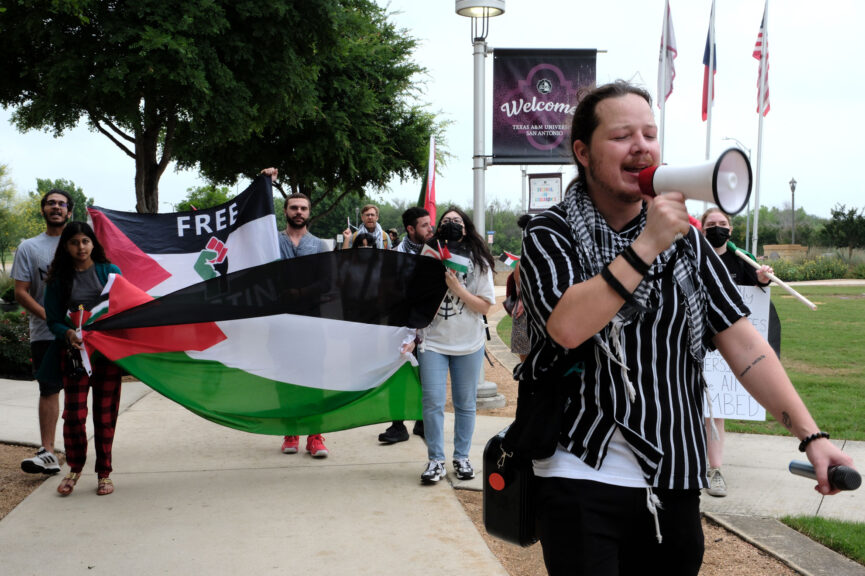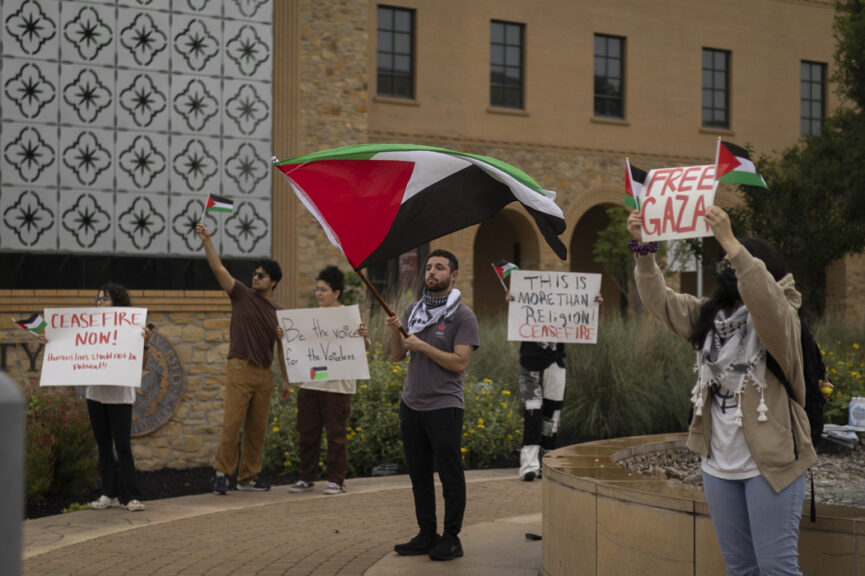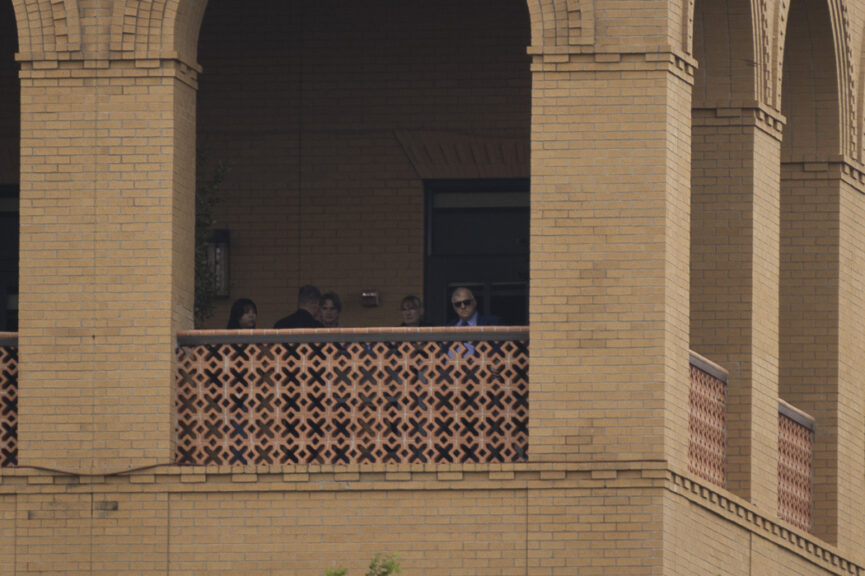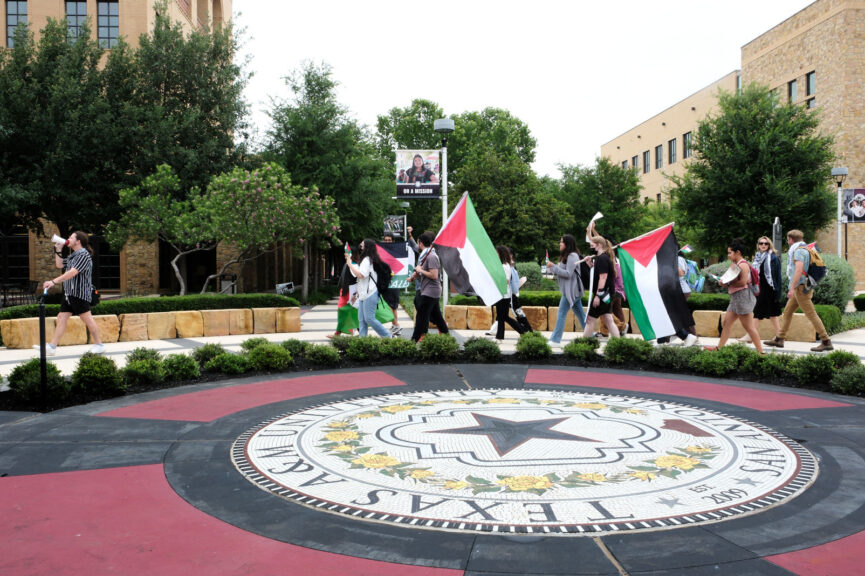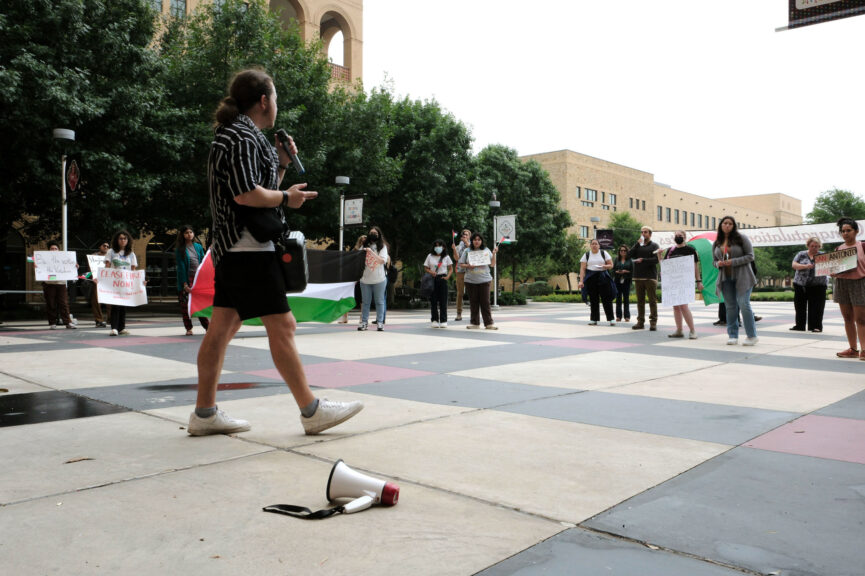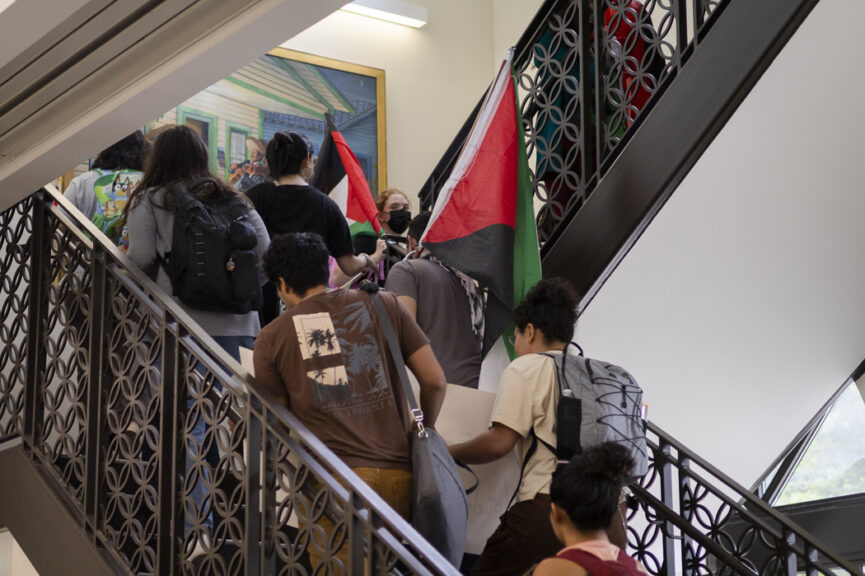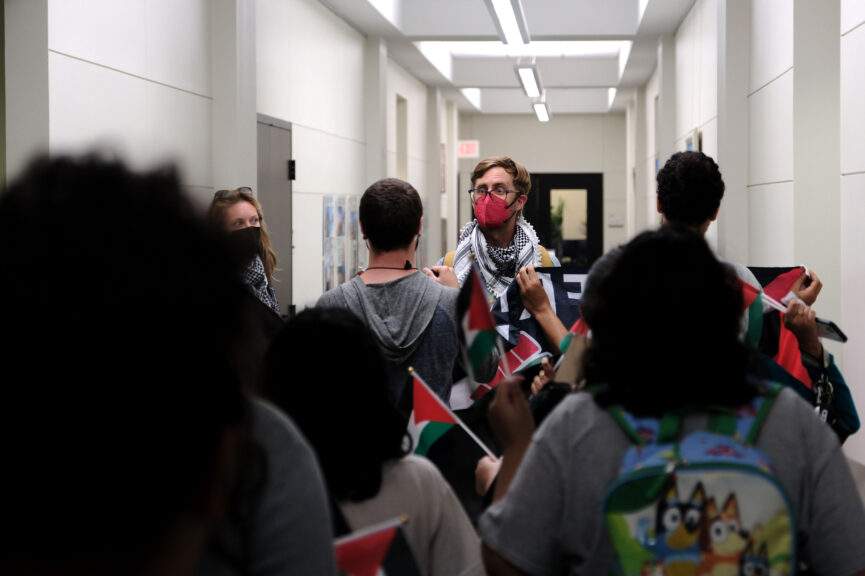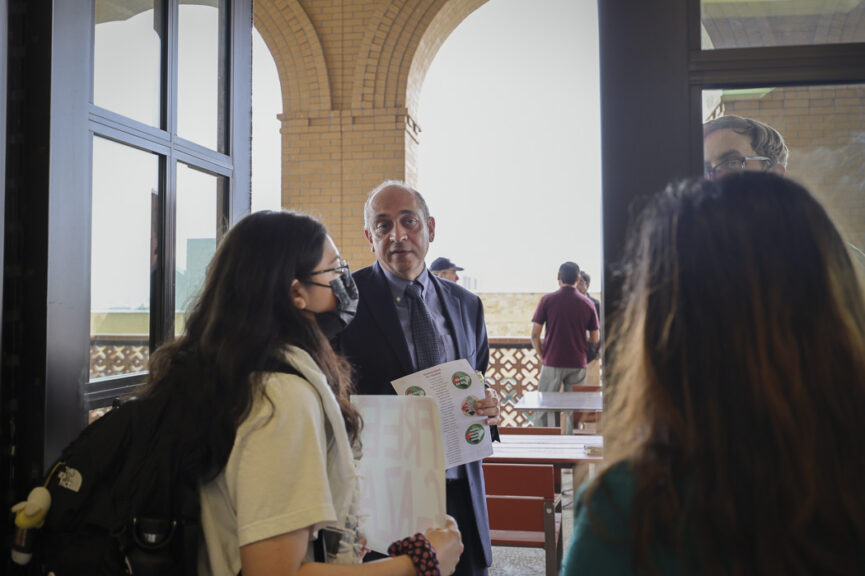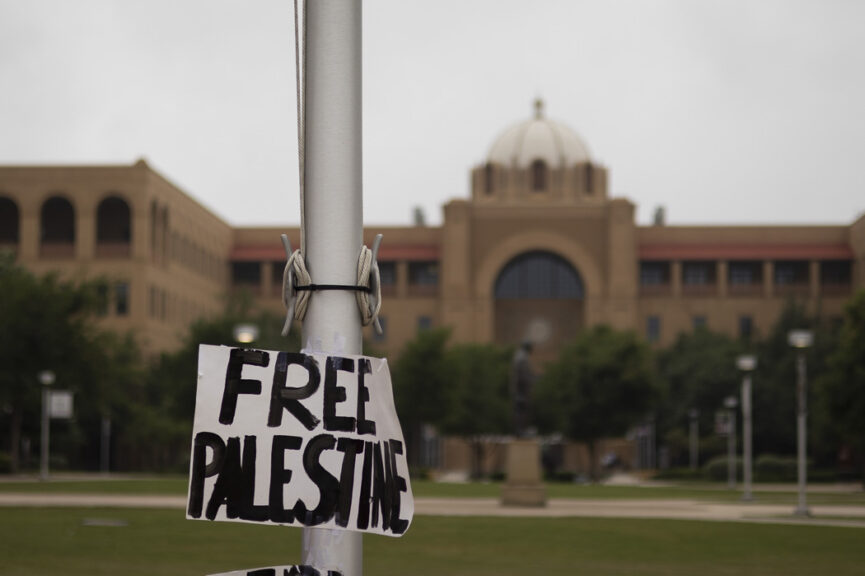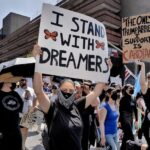About 20 Texas A&M University-San Antonio students and faculty members held a peaceful rally on campus May 1 calling for a free Palestine, seeking an end to Israel’s occupation in Gaza, voicing support for pro-Palestinian students arrested on U.S. campuses and demanding that A&M-San Antonio denounce Gov. Greg Abbott’s executive order that limits how students on Texas college campuses can protest the Israel-Hamas war and the type of speech used during these demonstrations.
The group of demonstrators donned keffiyehs, waved Palestinian flags and carried hand-made signs that featured phrases like “Free Gaza” and “Ceasefire Now!”
While one demonstration leader shouted pro-Palestinian chants through a megaphone, the other guided students with an outfitted sandwich board that read “We rally on our universities because Gaza’s universities were all bombed” as the students and faculty made their way through A&M-San Antonio’s campus.
The student organization Jags for Palestine organized the demonstration to deliver a letter to university president Dr. Salvador Hector Ochoa regarding Executive Order No. GA-44, which the group says “dangerously conflates support for Palestinian rights.”

The demonstrators were not able to deliver the letter to Ochoa, who was unavailable at the time.
Instead, leaders and members of the Jags for Palestine organization hand-delivered copies of the letter and spoke briefly to Jessica Loudermilk, A&M-San Antonio’s chief of staff and interim vice president for university relations and advancement, and Dr. Mohamed Abdelrahman, university provost and senior vice president for academic affairs.
Jags for Palestine was founded at the tail end of fall 2023, after psychology and communications junior Dylan Villalon met political science junior Carson Parkinson at a student walk-out in support of Palestine organized by Parkinson in early November.
The evening before the demonstration, Villalon said Jags for Palestine was looking for a direct response to their letter and for answers about how A&M-San Antonio students’ freedom of speech would be affected by Abbott’s executive order.
Jags for Palestine rally, march to president’s office; speak with provost and chief of staff instead
Prior to the event, Jags for Palestine had been told by an unnamed source that Ochoa would be having a meeting or interview on the third or fourth floor of the Central Academic Building at the day and time the demonstration would be taking place.
Demonstrators gathered shortly before 11 a.m. Wednesday at the campus fountain near the Madla Building. After speeches from Villalon and Parkinson, the group marched from the Madla Quad to the CAB courtyard and eventually made their way up to the fourth floor of CAB to deliver their letter to Ochoa.
However, Ochoa was nowhere to be found.
Sam Boykin, A&M-San Antonio’s senior communications manager, later told The Mesquite Ochoa was on planned leave that day.
Villalon rallied demonstrators outside of the Vista Room on the fourth floor. He asked them if they wanted to go to the president’s office to deliver the letter.
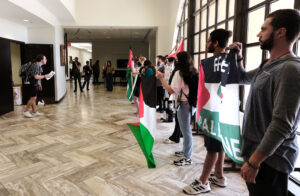
After whoops and cheers of agreement from the group, university police officer Sgt. Gerardo Duran bluntly told the group, “We’re not going to his office.”
Duran said he would allow two people to walk toward the president’s wing “but we’re not disrupting this environment — OK?”
Villalon and Parkinson walked towards the east end of the building but were not allowed to enter the president’s office, or even down the stretch of hallway that led to his office. Loudermilk met the two students at the end of the hallway leading to Ochoa’s office.
James Finley, Jags for Palestine adviser and associate professor of literature, led other demonstrators to the provost’s office on the same floor, where Abdelrahman was holding an open house for faculty.
After delivering a copy of the letter to Abdelrahman, criminal justice senior Jennifer Garcia told him, “As students, as Americans, we have the right to use our free speech. We need to have a very safe community and safe campus. We need to make sure that there’s no unnecessary force from police because as a student, we do have the right to speak on whatever we are wanting to speak on.”
Abeldrahman responded amicably and briefly to the group.

“And you guys have had that opportunity here, right? I mean, again, we are peaceful, we are not hurting anybody else. We’re fine,” Abdelrahman told Garcia. “Thank you for delivering this [letter]. I appreciate it.”
University police officers then escorted demonstrators down four flights of stairs and back into the CAB courtyard.
“He didn’t come see us. He sent his chief of staff,” Villalon said about Ochoa after the Jags for Palestine organization began rallying outside CAB again. “They told us he’s out — he’s on vacation. Which is the opposite of what his schedule told us.”
“They didn’t let us down the hallway. They had about five police officers at the end of the hallway for me and Carson,” Villalon said. “The chief of staff walked up to us — she was nice, cordial — took our letter and told us to have a good day.”
Villalon said the police presence felt like “grandstanding.”
While Villalon said he appreciated that officers were there to keep the peace and safety, he said it also felt undue. “We’re a small, non-threatening organization and group. It was a bit excessive. Not informal or nasty but just definitely a display, I would say.”
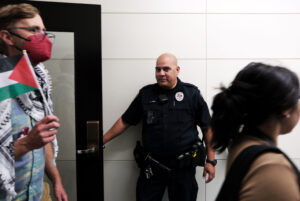
Villalon said if he and Parkinson were able to speak with Ochoa, he would have echoed the same sentiments that the group had been declaring throughout the event.
“I would implore [Ochoa] to open up a dialogue between student organizations when they start to inevitably update the guidelines on freedom of speech, as they’ve been ordered to by the executive office. So I would encourage, and expect, that open dialogue to come, whether formally or informally, public facing or otherwise,” Villalon said. “Anything less would be unacceptable.”
Montana Gomez, an English sophomore, had come to the protest after seeing a sign about the event. She felt inspired to come out and protest in the hopes that student action will help bring awareness and change.
“I was scared at first to get involved but that is the point,” Gomez said, explaining why she participated and hopes that other students get involved to. “Do it. If not for yourself, then do it for [the Palestinian people].”
Biology junior Sineka Zamora, heard about the march a week prior at a tabling event by Jags for Palestine.
“It’s a cause where I feel like our school is complacent on, to support us,” said Zamora. “I hope they read the letter and something will be done about it.”
Faculty members support demonstrators
Finley, who serves as the Jags for Palestine faculty adviser, is also a member of A&M-San Antonio’s chapter of the American Association of University Professors which also signed off on the letter to Ochoa.
“I hope that President Ochoa will recognize that the students are looking to him to protect their freedom of speech, freedom of assembly, and their educational experience.” Finley said, noting that he was speaking for himself as an independent citizen and not for the university. “I think that we have a responsibility as faculty to the students.”

“I love this institution,” Finley told the group of demonstrators after they returned to the CAB courtyard. “And one of the many things I love about this institution is the experience of working with first-generation college students…and as you all know, first-generation college students are the first people in their families to go to college. And I want to underscore that because our institution makes a lot of noise about first-generation students and supporting first-generation students. It’s a point of pride for our institution.
“In Gaza, there are last-generation college students. And what I mean by that is people who are going to be the last people in their family to go to college. This is in part because Israel has killed over 14,000 children in the last six months. 14,000 individual, beautiful, curious, inquisitive, hopeful children have been killed,” said Finley. “That is twice the population of this institution. 14,000 kids who are never gonna go to college.”
On April 30, Reuters reported that “more than 34,535 Palestinians have been killed and 77,704 wounded” by the Israeli military since Oct. 7 of last year. Israeli officials have recorded 1,200 people killed and 253 taken hostage by Hamas since that day as well. As of May 2, more than 100 hostages are still being held captive in Gaza by Hamas, according to PBS.
Scott Gage, associate professor of English and a member of A&M-San Antonio’s AAUP chapter, said he was at the demonstration to mainly support the students.
“In the recent weeks, we have seen an alarming attack on student free speech, and I think that we have students who are identifying a wrong that is happening in a world that our systems, our government and, in some instances, our higher education institutions are directly supporting,” Gage said. “I’ve been alarmed at how universities have responded to student free speech and I wanted to be here as a faculty member to show the students that they have our support and that we are here to support their voices and to make sure that their voices can be heard, free from aggressive responses from the university.”
Gage said university officials and law enforcement should try to start a dialogue instead of how they are treating student bodies right now.
“I think that when [students] see police in riot gear — that’s not talking, that’s not listening. When [students] see the threat of expulsion and suspension from a university — that’s not talking, that’s not listening. And for me I think that’s how universities should be responding. Hearing what the students are saying, hearing their demands and talking with them about those demands,” Gage said.
Dr. Martha Saywell, senior lecturer of music at A&M-San Antonio, supported Jags for Palestine and heard about the demonstration through a notice from Finley to the AAUP chapter on campus.
Saywell said that she would like to see A&M-San Antonio’s board of administration and Ochoa protect the students from Gov. Abbott’s order.
“I think it’s terrible,” Saywell said. “It suppresses free speech and it’s also disingenuous because [Abbot’s] framed it that any speech in support of Palestine is anti-semitic which is ridiculous, and I have no respect for him making that order at all.”
Administrator, bystanders admire students taking part in campus protest
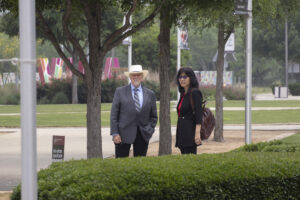
Dr. Charles Fey, interim vice president for student affairs, noticed the rally in front CAB and snapped a photo of the ongoing demonstration.
“Our students are peaceful,” Fey said. “They are concerned, loving, caring people, and this is exactly what you see here on campus.”
Amaury Nora, assistant director of assessment and analytics at A&M-San Antonio, was one of few university employees who watched the protest from a distance.
Nora said faculty and staff should have an open mind and listen to both sides of the debate, so the university can make informed decisions. He said that limiting one side can be considered censorship and that would go against the constitution and first amendment rights.

“Students who are not here today are missing out on an important time in what might be considered history,” Nora said. “It is so easy to criticize [the protest], but to actually participate in it is an important life lesson. It gives each student a chance to exercise their rights that, who knows, may be gone in the future,” Nora said.
Campus staff member Jorge Gonzalez was supporting demonstrators while on the clock.
He has been working in the cafeteria cooking students their food for five months now, and was surprised to see this much passion in a protest on A&M-San Antonio’s campus.
“I’ve never really seen a protest like this at a school,” Gonzalez said.
Gonzalez said he was unaware of the student arrests at protests at other universities, such as the University of Texas at Austin.
“Isn’t that their right?” he asked.
Johnathan Pena, Renne Estrada, Matthew Lizcano and Samuel Rocha contributed to this story.
This story was updated May 8 at 4:37 p.m. to include a brief statement about Ochoa’s absence from university officials.
